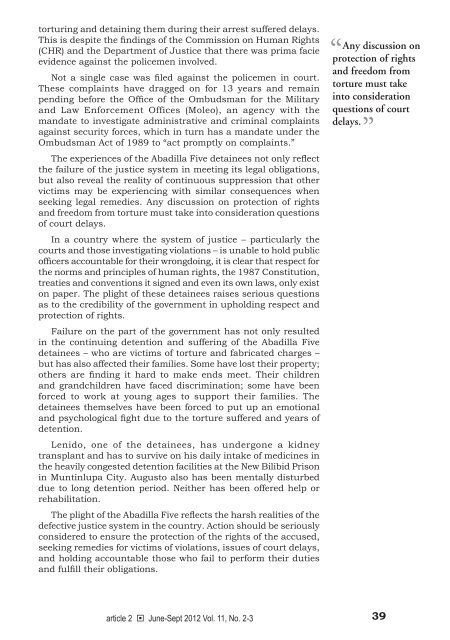You also want an ePaper? Increase the reach of your titles
YUMPU automatically turns print PDFs into web optimized ePapers that Google loves.
torturing and detaining them during their arrest suffered delays.<br />
This is despite the findings of the Commission on Human Rights<br />
(ChR) and the Department of Justice that there was prima facie<br />
evidence against the policemen involved.<br />
Not a single case was filed against the policemen in court.<br />
These complaints have dragged on for 13 years and remain<br />
pending before the Office of the Ombudsman for the Military<br />
and Law Enforcement Offices (moleo), an agency with the<br />
mandate to investigate administrative and criminal complaints<br />
against security forces, which in turn has a mandate under the<br />
Ombudsman Act of 1989 to “act promptly on complaints.”<br />
The experiences of the Abadilla Five detainees not only reflect<br />
the failure of the justice system in meeting its legal obligations,<br />
but also reveal the reality of continuous suppression that other<br />
victims may be experiencing with similar consequences when<br />
seeking legal remedies. Any discussion on protection of rights<br />
and freedom from torture must take into consideration questions<br />
of court delays.<br />
In a country where the system of justice – particularly the<br />
courts and those investigating violations – is unable to hold public<br />
officers accountable for their wrongdoing, it is clear that respect for<br />
the norms and principles of human rights, the 1987 Constitution,<br />
treaties and conventions it signed and even its own laws, only exist<br />
on paper. The plight of these detainees raises serious questions<br />
as to the credibility of the government in upholding respect and<br />
protection of rights.<br />
Failure on the part of the government has not only resulted<br />
in the continuing detention and suffering of the Abadilla Five<br />
detainees – who are victims of torture and fabricated charges –<br />
but has also affected their families. Some have lost their property;<br />
others are finding it hard to make ends meet. Their children<br />
and grandchildren have faced discrimination; some have been<br />
forced to work at young ages to support their families. The<br />
detainees themselves have been forced to put up an emotional<br />
and psychological fight due to the torture suffered and years of<br />
detention.<br />
Lenido, one of the detainees, has undergone a kidney<br />
transplant and has to survive on his daily intake of medicines in<br />
the heavily congested detention facilities at the new Bilibid Prison<br />
in muntinlupa City. Augusto also has been mentally disturbed<br />
due to long detention period. neither has been offered help or<br />
rehabilitation.<br />
The plight of the Abadilla Five reflects the harsh realities of the<br />
defective justice system in the country. Action should be seriously<br />
considered to ensure the protection of the rights of the accused,<br />
seeking remedies for victims of violations, issues of court delays,<br />
and holding accountable those who fail to perform their duties<br />
and fulfill their obligations.<br />
article 2 � June-Sept 2012 Vol. 11, No. 2-3<br />
“<br />
Any discussion on<br />
protection of rights<br />
and freedom from<br />
torture must take<br />
into consideration<br />
questions of court<br />
delays.<br />
”<br />
39


